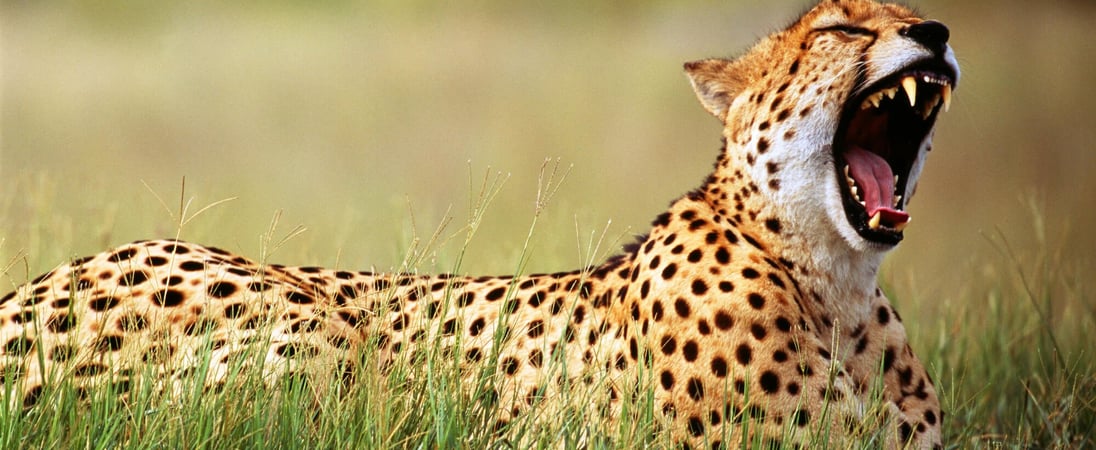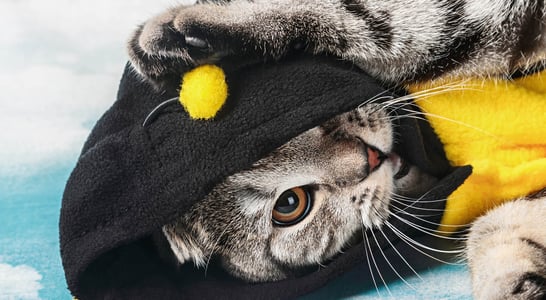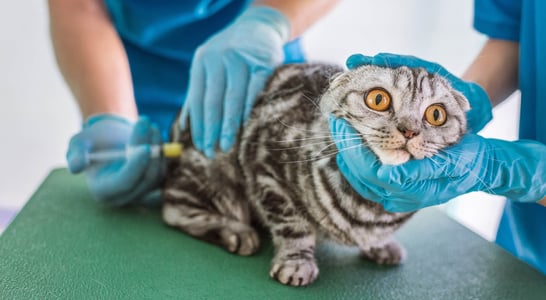
International Cheetah Day
Nature's sprinters, these swift creatures embody grace and speed, painted in a golden coat, thriving in the wild savannah landscapes.
They are mother nature’s precision, high-performance machine, designed to do one job and to do it with incredible skill and effectiveness.
They can accelerate faster than a Ferrari, tearing up the ground from 0-75 mph in just 3 seconds, and they come with a self-grown paint-job that would make the fanciest of muscle cars blush with envy. That’s right, we’re talking about the Cheetah!
International Cheetah Day celebrates these incredible animals while raising awareness about their threat of extinction. So get ready to enjoy Cheetah Day!
History of International Cheetah Day
As founder of the Cheetah Conservation Fund (CCF), Dr. Laurie Marker chose to commemorate Khayam, a cheetah she raised at the Wildlife Safari that she ran in Oregon, by establishing December 4th as International Cheetah Day in his memory.
Khayam served as part of an important experiment that helped in determining whether or not captive Cheetahs can be taught to hunt and live in the wild on their own after being in captivity. After a trip to Namibia, the experiment was proven successful.
However, Dr. Marker and Khayam still returned home following the experiment, after observing that local hunters were eliminating wild cheetahs as a threat to their livelihood.
Driven by this encounter, Dr. Marker decided to move to Namibia to help heal the rift between farmers and the majestic cheetah. It was in 1990 that she founded the CCF. Cheetahs are incredible animals, being the fastest land mammal in the wild today.
Sadly, though the numbers used to be significantly higher, there are only 8,000 of these creatures left in the wild today, a number that leaves them as Africa’s most endangered feline.
Cheetahs hold their position as the world’s fastest land mammal, thanks to some tricks that have perfectly adapted them for high speed.
The cheetah’s full running speed is so fast that their feet only touch the ground once every 6 to 7 meters, and their muscular tail helps to steer them like a rudder at these high speeds. Needless to say, once a cheetah has prey in their sites, there’s no running away!
How To Celebrate International Cheetah Day
Celebrating International Cheetah Day is meant to not only be fun, but also educational. It’s an important day to raise awareness for wildlife, so try out some of these ideas to honor the day:
Learn All About Cheetahs
First, this is the perfect day to learn everything possible about these amazing animals. Try out these ideas for getting more involved in the world of cheetahs:
- Watching documentaries is a fascinating way to learn about the plight of these beautiful creatures. A few options are available, including Running for Their Lives, Cheetah: Against All Odds, or the BBC’s Cheetah Family & Me.
- Attend a variety of functions held on International Cheetah Day at various local zoos.
- Read books about cheetahs to children, whether buying them or borrowing them from the local library. These might include titles such as How Many Spots Has a Cheetah Got? by Steve Martin; Oshok and the Cheetah by Arjun Dhol; or the amazing photography book, Remembering Cheetahs by Wildlife Photographers United.
Host an International Cheetah Day Party
Get some friends, family or coworkers together and host a party that means something! Use a cheetah theme and have decorations resembling the cheetah spots or also a jungle theme.
When guests arrive, give them all headbands with cheetah ears on them to wear at the party. Serve snacks along the theme, such as Cheetos Paws or make a decorate a cheetah cake. Finally, for the evening’s entertainment, watch a cheetah documentary (listed above).
Don’t forget to make the party into a fundraiser by asking guests to bring a donation with them, or getting some gifts ahead of time that can be used to create a fundraising auction. While there, invite everyone to sign up for Cheetah Conservation Fund newsletters so they can stay informed.
Help with Cheetah Conservation
Once a new (or growing!) appreciation for these high-speed mammals has been developed, it’s time to start finding ways to help with their conservation.
Many valuable and credible organizations have been striving to make a change for the better for these animals. Join in by volunteering or making a donation to one of these groups:
- Cheetah Conservation Fund
This organization (mentioned above) was founded in Namibia in 1990. Their website offers many options for education and donating, as well as purchasing resources that support the animals. In addition to simply making a donation, friends can actually sponsor a cheetah, whether monthly or for a full year. - African Wildlife Foundation
Committed to protecting animals all over the continent of Africa, the AWF has been working toward solutions related to building communities and avoiding human-wildlife conflict. - Big Cat Conservation
An organization in the UK, this group supports projects that help a variety of Big Cats around the world.
Spread the Word About International Cheetah Day
Getting the community involved with saving the cheetahs is ideal when it’s combined with efforts from the local zoo.
People who live in a place where their local zoo doesn’t have an International Cheetah Day celebration, might decide to contact them and see what can be done to arrange one, even volunteering to help run it if need be!
The cheetah is known for being incredibly fast, but with your help, together we can slow down its extinction.
International Cheetah Day FAQs
How did a cheetah named Khayam influence the establishment of International Cheetah Day?
In 1977, Dr. Laurie Marker raised a cheetah cub named Khayam at Wildlife Safari in Oregon.
She took Khayam to Namibia to test if captive-born cheetahs could learn to hunt in the wild. The experiment succeeded, highlighting the potential for rewilding.
This experience inspired Dr. Marker to found the Cheetah Conservation Fund in 1990 and later establish International Cheetah Day on December 4th, Khayam’s birthday.
What unique physical adaptations enable cheetahs to achieve their remarkable speed?
Cheetahs possess a lightweight frame, long limbs, and a flexible spine, allowing strides up to 7 meters.
Their large nasal passages and lungs facilitate rapid oxygen intake, while semi-retractable claws provide traction. A long tail aids in balance and steering during high-speed chases.
Are there any cultural myths or legends associated with cheetahs?
In African folklore, cheetahs are often depicted as symbols of speed and hunting prowess.
Some tales suggest that the distinctive “tear marks” on their faces are the result of a mother cheetah’s tears after her cubs were taken by humans, symbolizing the species’ vulnerability.
How do cheetahs’ social structures differ from other big cats?
Unlike many solitary big cats, male cheetahs often form coalitions, usually consisting of brothers from the same litter.
These groups collaborate in hunting and territory defense, enhancing their survival prospects. Female cheetahs, however, tend to be solitary, except when raising cubs.
What role do cheetahs play in their ecosystems?
As apex predators, cheetahs help maintain healthy herbivore populations by preying on the weak and sick.
This natural selection process promotes robust prey species and prevents overgrazing, which can lead to habitat degradation.
How has the cheetah’s range changed over the past century?
Historically, cheetahs roamed across Africa, the Middle East, and into India.
Over the past century, their range has significantly diminished due to habitat loss, human-wildlife conflict, and poaching.
Today, they occupy only a fraction of their former territories, with small populations in Iran and reintroduction efforts in India.
What are some misconceptions about cheetahs’ hunting abilities?
A common misconception is that cheetahs rely solely on speed to catch prey.
While they are the fastest land animals, cheetahs also use stealth and strategy, approaching prey closely before initiating a high-speed chase to conserve energy.
How do cheetahs communicate with each other?
Cheetahs communicate through vocalizations like chirps, purrs, and growls. They also use body language, such as facial expressions and tail positions, to convey emotions and intentions to other cheetahs.
What unique challenges do cheetahs face in captivity?
In captivity, cheetahs often experience stress due to limited space and lack of stimulation.
They require specialized care, including opportunities for exercise and mental enrichment, to maintain their physical and psychological health.
How can individuals contribute to cheetah conservation efforts?
People can support cheetah conservation by donating to organizations like the Cheetah Conservation Fund, raising awareness through social media, and advocating for policies that protect cheetah habitats.
Participating in eco-tourism initiatives that support local communities and conservation can also make a positive impact.
Also on ...
View all holidaysNational Cookie Day
Bake some sugary, buttery and perfectly rounded snacks, indulge in classics like chocolate chip or experiment with unusual flavors like lavender or cheese.
National Sock Day
These little pieces of fabric we wear on our feet are an important part of being cool and comfortable all day long.
World Wildlife Conservation Day
Dedicated efforts to protect our planet's incredible creatures and their habitats, ensuring future generations get to share in the wonder of nature.
Cabernet Franc Day
Savoring a glass of this wine variety unveils a world of rich flavors and unique characteristics, making each sip a delightful journey.
We think you may also like...
National Dress Up Your Pet Day
Set up a literal catwalk and treat your furry friends to some safe, comfortable fashion, organize a fun photo shoot or go all out with matching outfits.
National Cat Herders Day
From project managers to parents, show appreciation for people in your life who achieve seemingly impossible tasks with patience and humility.








